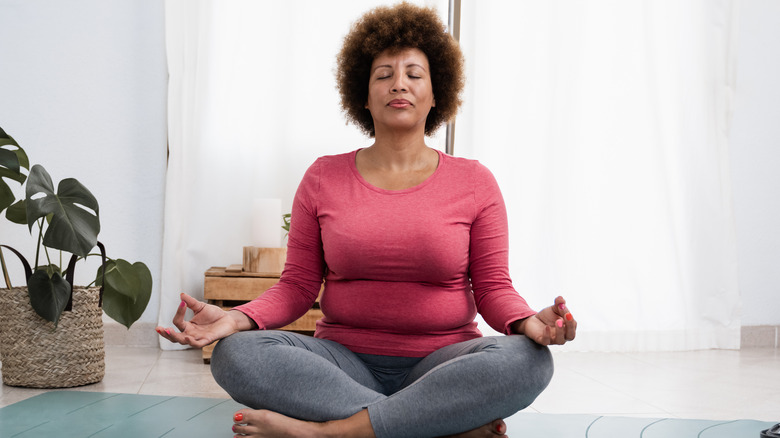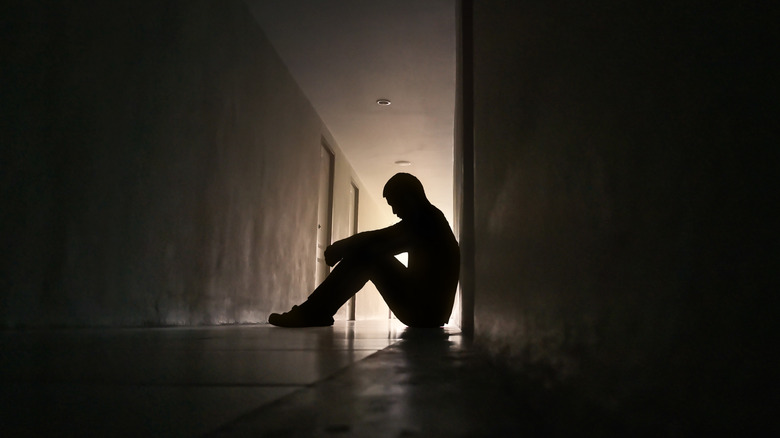Can Trendy Darkness Retreats Really Add Anything To Your Mental Health Journey? What We Know
In the ever-shifting world of modern wellness, darkness retreats are the newest trend. If you haven't heard about darkness retreats from celebrities like Aaron Rodgers, allow us to explain. Darkness retreats are an ancient tradition where a person isolates themselves in complete darkness for an extended period of time. The intention behind the practice is that a dark and isolated space will allow for self-reflection, awareness, and rest that are heightened during a voluntary state of solitude.
May is Mental Health Awareness Month, which observes the rituals and events that promote positive mental health and self-image. When you think of preserving your mental health, you may think of the luxurious self-care practices that are promoted by social media influencers. But how often do you consider a darkness retreat as a form of preservation and clarity? There are a multitude of reasons that darkness retreats are believed to be an effective treatment for those suffering from anxiety and depression. On the other hand, there is also opposition to the idea of isolation as a form of healing. If you're wondering whether a darkness retreat is the right choice for you, you've come to the right place.
It's interconnected with spirituality
If you consider yourself a spiritual person, you'll be happy to know that darkness retreats are grounded in spiritual beliefs and practices. Mindfulness, harmony, and inner peace are all pillars of spirituality and can be enhanced through isolation while sending you into a state of deep relaxation. As dating coach Minnie Lane described to Glamour, "When I say pitch black, I really mean it — you can't see anything at all the entire time you're in there, not even your own body, which is a surreal experience in itself."
Sensory deprivation is also a core belief of spiritual thinking, which promotes the idea that ultimate self-discovery can only be accessed through a deeper state of consciousness. In a room deprived of sound and light, you are a soul before a physical being, capable of accessing your innermost experience. "Personally, I have experienced huge increases in clarity, focus, and insight during my darkness retreats," Lane explained when dissecting her own experience at a darkness retreat.
It forces you to confront unwanted thoughts
On the other hand, darkness retreats may be difficult if you struggle with mental health conditions that include having intrusive thoughts, or unwanted thoughts, images, and urges. Darkness retreats may put you in the uncomfortable — and often anxious, terrifying, and inescapable — position of having to confront your thoughts. If this is the case for you, sensory deprivation might trigger some of your more difficult thoughts, intrusive thoughts, or bring up a repressed feeling without proper resources to process them.
While there are no known physical dangers of darkness retreats, it could cause emotional damage that persists beyond the sensory deprivation experience. Additionally, emotional turmoil might cause an unexpected physical reaction that you might not be equipped to handle alone. Before deciding whether or not to go on a darkness retreat, it may be best to consult a therapist or clinical professional to know if it's something you're ready for (and it's okay if you're not!).
Try a no-distraction room first
If a long weekend at a darkness retreat sounds intimidating, you can start by creating a no-distraction room and practicing in it for an hour. Lane suggested to Glamour readers that "When you're in the dark, nothing actually happens, yet you still experience an emotional journey similar to being in real life." You can simulate a similar feeling through a dark room in your own space, where you can leave whenever you want. It may bring you clarity on whether or not a darkness retreat seems right for you, giving you the courage to self-reflect in the process.
You can also simulate sensory deprivation through practices like meditation, focused breathing, hypnosis, or conscious dreaming, if starting in a quiet room seems too intense. Other spiritualists recommend flotation therapy, which places someone in a zero-gravity tank that allows for a meditative space through spa-like activities, rather than a dark room. While darkness retreats are completely devoid of light, float therapy is not. It is ultimately up to you how you practice and maintain your mental health, and we'll be here to provide the information and resources you need to make your decision.



